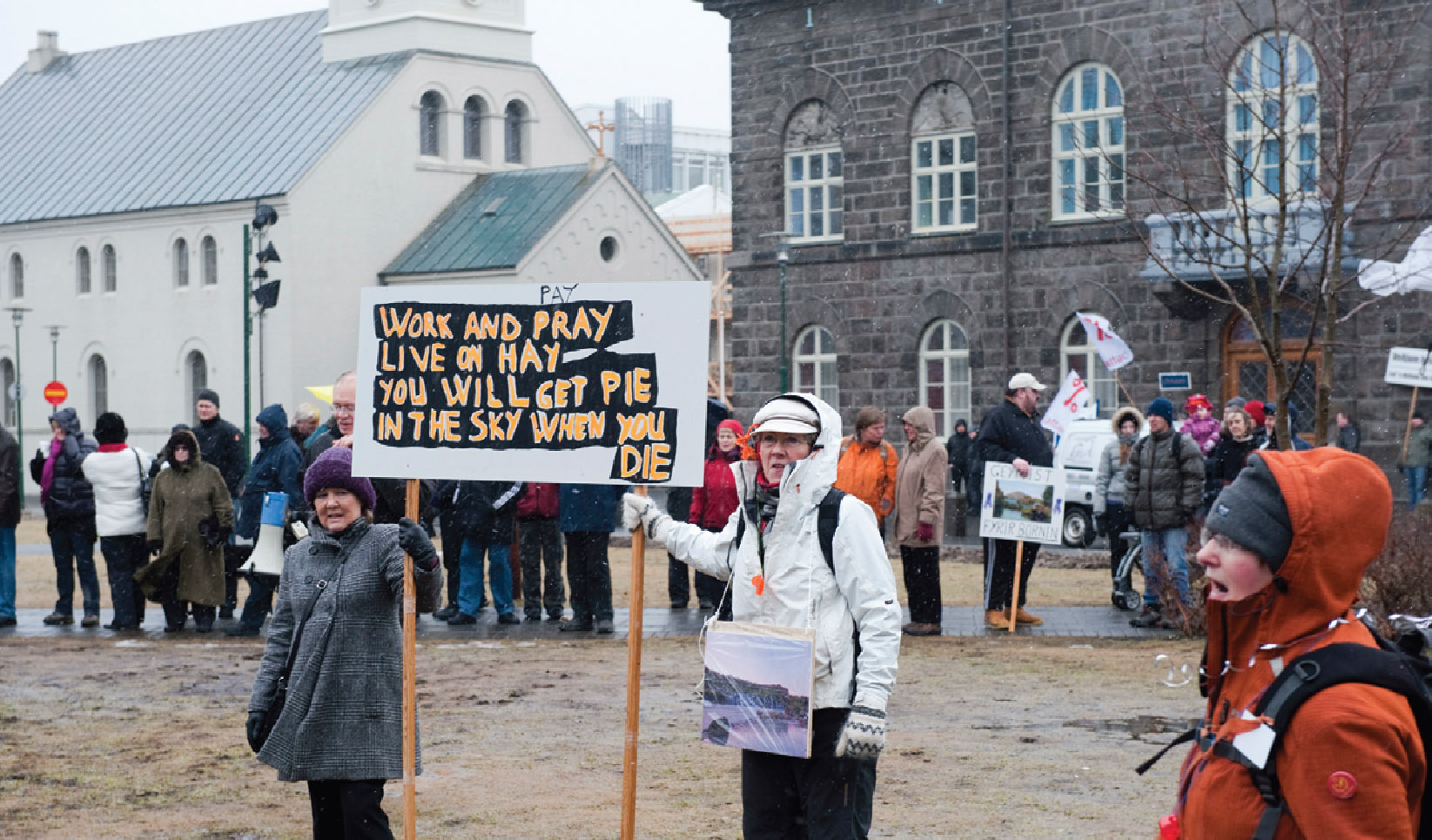Chapter 12: HEADLINES: Economic Crisis in Iceland

International macroeconomics can often seem like a dry and abstract subject, but it must be remembered that societies and individuals can be profoundly shaken by the issues we will study. This article was written just after the start of the severe economic crisis that engulfed Iceland in 2008, following the collapse of its exchange rate, a financial crisis, and a government fiscal crisis. Real output per person shrank by more than 10%, and unemployment rose from 1% to 9%. Five years later a recovery was just beginning to take shape.
Reykjavik—
Each week, up to 550 families queue up at a small white brick warehouse in Reykjavik to receive free food from the Icelandic Aid to Families organisation, three times more than before the crisis.
Rutur Jonsson, a 65-
“I have time to spend on others and that’s the best thing I think I can do,” he said as he pre-
In a small, close-
“It was very difficult for me to come here in the beginning. But now I try not to care so much anymore,” said the weary-
The contrast is brutal with the ostentatious wealth that was on display across the island just two years ago, as a hyperactive banking sector flooded the small, formerly fishing-
Back then, the biggest worry for many Icelanders was who had the nicest SUV, or the most opulent flat.
But today visible signs of poverty are quickly multiplying in the Nordic island nation, despite its generous welfare state, as the middle class is increasingly hit by unemployment, which is up from one to nine per cent in about a year, and a large number of defaults on mortgages.
Icelanders who lose their job are initially entitled to benefits worth 70 percent of their wages—
“The 550 families we welcome here represent about 2,700 people, and the number keeps going up. And we think it will keep growing until next year, at least,” said Asgerdur Jona Flosadottir, who manages the Reykjavik food bank.
For Iris, the fall came quickly.
She is struggling to keep up with payments on two car loans, which she took out in foreign currencies on what proved to be disastrous advice from her bank, and which have tripled since the kronur’s collapse.
Threatened in November with eviction from her home in the village of Vogar, some 40 kilometres (25 miles) southwest of Reykjavik, she managed to negotiate a year’s respite with her bank.
“I feel very bad and I am very worried,” she said, running her fingers through her long, brown hair.
“I’ve thought about going abroad, but decided to stay because friends have come forward to guarantee my loans,” she added sadly, before leaving with a friend who was driving her back home.
To avoid resorting to charity, many other Icelanders are choosing to pack their bags and try for a new future abroad, with official statistics showing the country’s biggest emigration wave in more than a century is underway.
“I just don’t see any future here. There isn’t going to be any future in this country for the next 20 years,” laments Anna Margret Bjoernsdottir, a 46-
For those left behind, a growing number are having trouble scraping together enough money to put decent food on their children’s plates.
While only a minority have been forced to seek out food banks to feed their families, some parents admit to going hungry to feed their children.
“I must admit that with the hike in food prices, my two sons eat most of what my husband and I bring home,” Arna Borgthorsdottir Cors confessed in a Reykjavik cafe.
“We get what is left over,” she says.
Questions to Consider
After reading Economic Crisis in Iceland, consider the question(s) below. Then “submit” your response.
Question
1. Iris is struggling to pay two car loans borrowed in foreign currency. This type of situation is problematic not only for the individuals of Iceland but also for the large financial institutions. Why can borrowing in foreign currencies be harmful if there is a large depreciation in the home currency? What would happen to Iris’s ability to pay if there had been a large appreciation of the home currency instead?
Question
2. Iceland’s financial collapse after the 2008 financial crisis in the United States is often overlooked in the media. How does the story of Iceland’s financial crisis compare to those of Greece, Spain, Italy, and Ireland?
Question
3. After gaining large sums of wealth through selling fishing quotas many Icelanders found themselves seeking out investments that were both risky and rewarding. These investors found purchasing Japanese yen and using the yen to make investments within Iceland extremely profitable. How could this behavior have contributed to the financial crisis in Iceland?
Question
4. What reforms have Icelanders implemented following the collapse? Have these helped the economy recover?